How Paris win propelled Scotland players into British & Irish Lions squad
- Published
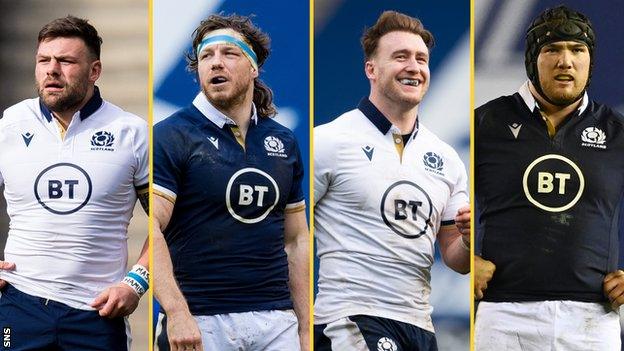
Rory Sutherland, Hamish Watson, Stuart Hogg and Zander Fagerson have been selected in the British & Irish Lions squad
Jim Telfer only got it half right in his storied speech before the first Test in South Africa almost a quarter of a century ago.
When he said that being selected for the British and Irish Lions was the easy bit (and that winning with the Lions was the ultimate) he couldn't have known how monstrously difficult it was going to become for Scots to get in the frame in the tours that followed.
For the Scottish hopefuls, being selected hasn't been easy, it's been brutally hard.
That changed on Thursday when eight Scottish players were named in Warren Gatland's 37-man party for what will be the most unusual Lions trek since the time the tourists travelled by boat, played 21 games in New Zealand, another seven in Australia before stopping off in Sri Lanka for another match and then ventured home six months after they had departed.
It was 1930 and there was only one Scot on the trip. There was no outcry at the time - or none that we can find at any rate - but there's been plenty in recent years.
Four years ago Gatland was criticised after only two Scots made the initial squad. He was scrupulously fair then and is scrupulously fair now. Not everybody will agree with him - that's an impossible mission - but his squads are picked on merit, nothing else.
Scotland no longer has to watch the jamboree through the window. What this will do for the confidence and aura of the eight is anybody's guess, but it can only help.
It's a proud moment for them individually and potentially a huge moment for the country collectively. Scotland needs players for young people to look up to. Becoming a Lion puts you on different plane. Becoming a Test Lion is something else entirely. Victories in England and France and now this. Heady days at last.
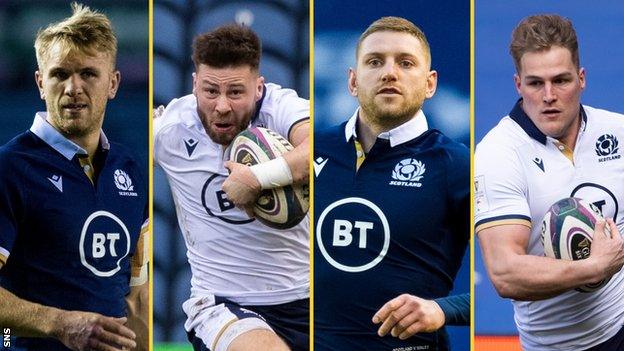
Chris Harris, Ali Price, Finn Russell and Duhan van der Merwe are the other Scots in Warren Gatland's squad
Given the disappointment of Scotland's lack of involvement in the past five tours, there was always a place for fatalism in the days leading up to Gatland's call.
There was surreal talk in some quarters of Hamish Watson being too small to face the gargantuan Springboks despite the fact that Watson was consistently one of the best ball carriers in terms of number of carries and metres made with ball in hand during the recent Six Nations.
Of course Watson made it. He's an outstanding rugby player. There were concerns over Rory Sutherland's injury. When Edinburgh head coach Richard Cockerill announced a few weeks back that the prop could be missing for up to two months the natural inclination was to wince. He was always a prime contender for one of the three loosehead spots, but this injury threatened one of the great comeback stories.
Sutherland has had a monumental battle with serious injury, a fight that put him in a wheelchair at one point. He has had to battle like a beast to get back to Test level. He's an example to everybody, rugby or otherwise. He could have relented to a grim prognosis years ago, but didn't. He fought on.
Zander Fagerson has had his own uncertainties. When he was sent off against Wales in the Six Nations his chances looked like they'd suffered a mortal blow, but he came again. Fagerson has been a different player since the despondency of the 2019 World Cup. Some around him would say that he has been a different player since becoming a father.
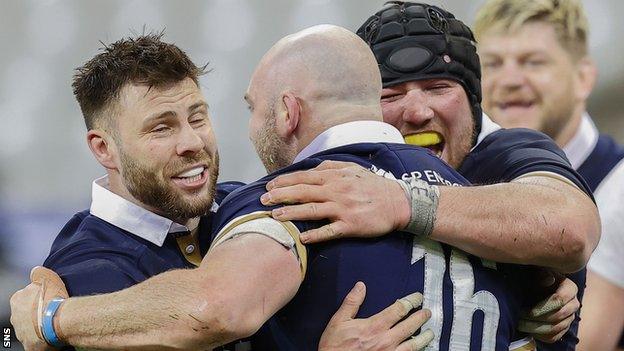
Ali Price (left) and Zander Fagerson (right) played their part in Scotland's memorable win in France
He always had the physical stature and the scrummaging power to make it to the very top, but you wondered if he knew it himself, if he was aware of how good he could be if only he started to believe.
Almost certainly, the victory in France will have clinched Fagerson's spot. He was extraordinary, not just in his stability in the set-piece but in his effectiveness around the field.
Against a savagely physical French side Fagerson carried and carried. He made 59m with ball in hand. That's more metres gained by any prop in any of the Six Nations games. Lions captain Alun Wyn Jones was second for his carrying against France and it's Fagerson again in third for his metres against Italy.
That game in Paris showed that on the biggest, most pressurised occasions against one of the most gnarled packs in the world game, Fagerson was more than up to it. And that goes for quite a few of the Scots.
The Scottish renaissance stories don't just begin and end with Fagerson and Sutherland. Chris Harris was another colossus in Paris. His work in defence was something to see, not especially in the power of his tackling but in the intelligence of his game management, his ability to read situations and impending danger and then making a decisive decision to eliminate the threat. He was exceptional.
Harris is now a Lion. When he first came into the Scottish team he suffered a calamity in just his second Test. It was the opening game of the 2018 Six Nations. Gatland, now the Lions coach, against Gregor Townsend, now the Lions assistant coach. Wales won 34-7 and Harris could not have looked more out of place.
From there to here has been quite a journey. Harris made it ahead of Garry Ringrose, Henry Slade, Jonathan Davies and Manu Tuilagi - all more fancied in the myriad pundit selections that came before the real one.
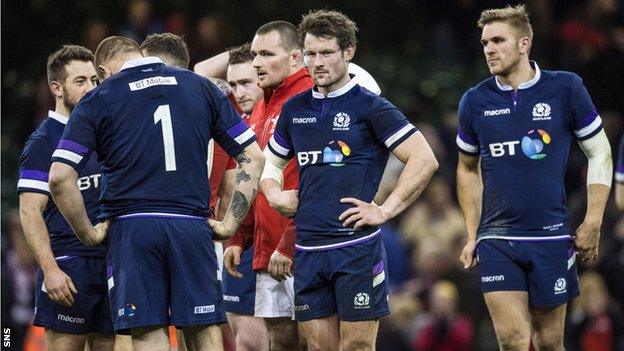
Chris Harris (far right) has recovered from a difficult start to international rugby
There were occasional tremors about Finn Russell in the preamble. He's not Gatland's typical 10, that's for sure, but that Paris match illustrated that Russell can play the percentages when he needs to without a more conservative style impacting greatly on his natural flair. He got the balance just right that night, up until his red card. It was his most complete performance in a Scotland jersey in years.
If Gatland was minded to sacrifice Russell for Johnny Sexton, even allowing for his recent spate of head traumas, he would have had Townsend in the room to bring more to the debate. We'll have to wait to discover the truth of what went on in the selection meeting, but Townsend and Steve Tandy would have been significant in places.
Townsend wouldn't argue for a Scot just for the sake of getting the numbers up - a Lion himself, he'll be way above the parochial stuff - but Russell's inclusion is both a delight and a relief.
It tells us that the Lions are open to playing against the Boks, not just trying to compete with them in a war of attrition. Russell is another man who has come an awfully long way since the dispute that saw him play no part in the 2020 Six Nations. Russell's return is now complete.
His old Glasgow flat-mate, Ali Price, was something of a surprise. He was always in the conversation but the third scrum-half slot (Conor Murray and Gareth Davies being the frontrunners) must have been a tight call. There was a bit of bandwagon behind Danny Care. Tomos Williams was mentioned widely. Price made it. A reward for Scotland's huge improvement in 2021.
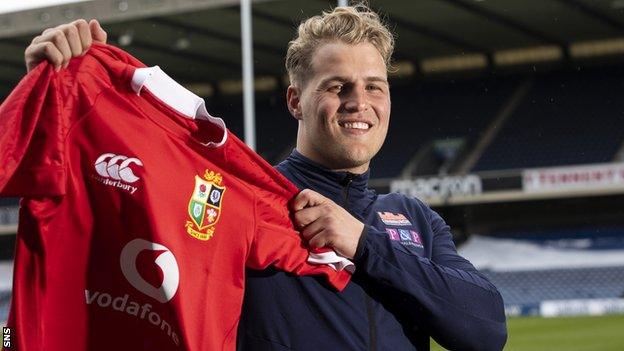
Duhan van der Merwe is relatively inexperienced at Test level
Big Duhan van der Merwe ate up ground in the Six Nations. He's big and fast and ferociously hard to stop when he gets up a head of steam. His finishing power is awesome. There are doubts about his defence and his positional sense when the ball is in the air around him, but Gatland saw brute force and went for it.
This time last year the South Africa-born wing had no caps. Now he has 10 with eight tries and a Lions tour to look forward to. Dizzying doesn't even come close to describing his story.
Stuart Hogg was always a shoo-in and his target now is to go one step further than he has done in his previous two Lions tours. He has to become a Test Lion.
All eight Scottish players have it in their gift to play in the series. It's up to them now. The easy bit, as Telfer called it, is over. The truly hard work is just beginning.
